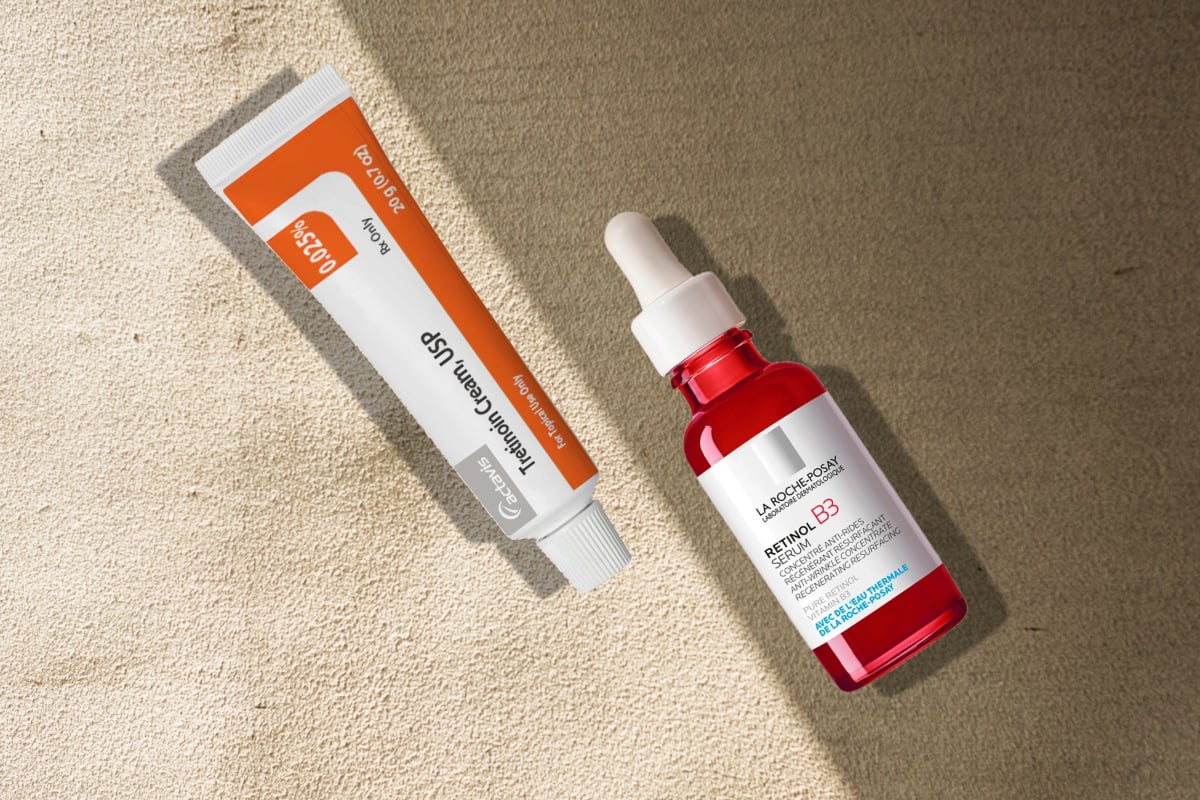This article has been reviewed by Dr. Luisa Fanzani, a Los Angeles-based cosmetic chemist dedicated to educating people on skincare.
Retinyl propionate is definitely a game-changer for anyone who can’t stand retinol, storming the skincare world as one of the most potent yet gentle forms of retinoids. So if you find retinol too hard to tolerate, you’ll most likely get in love with retinyl propionate and what it has to offer to your skin.
Without further ado, today’s focus stays on retinyl propionate vs. retinol, giving you a breakdown of the differences between the two so you can figure out which one is best for you.
What is retinyl propionate?
Just like retinol, retinyl propionate is a member of the retinoids family, a vitamin A derivative with skin-renewing properties. More precisely, retinyl propionate is an ester form of vitamin A resulting from binding retinol molecules to propionic acid — a fatty acid used to enhance retinol’s feel and effectiveness.[1] The role of retinyl propionate in skincare is to mimic all retinol benefits without adverse effects such as irritation and dryness.
As a matter of fact, esterification of vitamin A derivatives is a common practice to create more stable forms of retinol called retinyl esters by modifying the molecular structure and how retinol is converted into the body. If you aren’t familiar with retinyl propionate in skincare, you may have heard of retinyl acetate or retinyl palmitate, which are also retinol esters similar but not identical to retinyl propionate.
Now, is retinyl propionate actually better than retinol? While both retinol and retinyl propionate are retinoids that can improve the appearance of skin by encouraging cell turnover, their biological activities and molecular structure are unique, making them function differently once they penetrate the skin layers.
This takes us to the next part:
Retinyl propionate vs. retinol
The main difference between retinyl propionate and retinol is that retinyl propionate has to pass through more conversion steps to get into the active form of vitamin A compared to retinol. This makes retinyl propionate work more gently than retinol while still having all the benefits of vitamin A.
Let me explain. For a retinoid to provide benefits, it must be converted in the body into the active form of vitamin A, called retinoic acid. Basically, this conversion process affects the potency of the retinoids, whereas the more steps involved, the weaker the retinoid is. Retinol is known as one of the most powerful OTC retinoids and the closest relative of retinoic acid since it needs to be converted only twice to get into vitamin A active form. Still, that doesn’t mean retinol is the best, as being that close to retinoic acid also makes it unstable and aggressive for the skin.
Here’s where retinyl propionate takes the stage.
Retinyl propionate is thought to be gentler than retinol because it needs to undergo one more conversion step to get into retinoic acid — the same with all retinyl esters. However, there are two problems with retinyl esters. One is that they are less effective due to the body’s low conversion rate of retinoic acid, and two, they have a low skin penetration rate due to their large molecular weight. But fortunately, that’s not the case with retinyl propionate.
In fact, a 2021 study found out the unique metabolic profile of retinyl propionate has better retinoid-related bioactivity over retinol and retinyl palmitate.[2]
More than that, it was confirmed retinyl propionate has higher skin penetration levels (similar to retinol) than other retinyl esters due to its molecular size. Compared to retinyl palmitate, whose large molecule doesn’t allow it to enter the skin as effectively, retinyl propionate has a molecule weight small enough to reach its site of action but large enough to minimize the chances of irritation.
So, according to those studies, retinyl propionate is as effective as retinol while caring less adverse effects. However, as much as we’d like to give credit to retinyl propionate, it’s still poorly researched compared to retinol. Although it’s true that retinyl propionate is gentler than retinol, it is difficult to confirm for sure whether or not it’s as effective due to limited research. That said, retinol still remains the best choice, and you should only use retinyl propionate if your skin can’t tolerate retinol.
The takeaway
While other retinol esters are questionable, retinyl propionate remains the most promising one, providing all the benefits of vitamin A but without irritations. Retinyl propionate is a great retinol alternative, and its benefits include increasing cell renewal, stimulating collagen production, reducing wrinkles, fading dark spots, tackling acne, and softening rough skin.
- National Center for Biotechnology Information (2022). PubChem Compound Summary for CID 6394572, Retinyl propionate. Retrieved January 8, 2022, from https://pubchem.ncbi.nlm.nih.gov/compound/Retinyl-propionate.
- Bjerke DL, Li R, Price JM, Dobson RLM, Rodrigues M, Tey C, Vires L, Adams RL, Sherrill JD, Styczynski PB, Goncalves K, Maltman V, Przyborski S, Oblong JE. The vitamin A ester retinyl propionate has a unique metabolic profile and higher retinoid-related bioactivity over retinol and retinyl palmitate in human skin models. Exp Dermatol. 2021 Feb;30(2):226-236. doi: 10.1111/exd.14219. Epub 2020 Nov 5. PMID: 33098193.




![Does resveratrol in red wine benefit your skin? While sipping on a glass of red wine can be a delightful experience, relying on it for skincare benefits is not the best idea. Sure, red wine contains a smidge of resveratrol, but let's put things into perspective. The concentration of resveratrol in red wine is relatively low. Red wines, specifically Pinot noir from France, typically contain 0.361-1.972 mg of resveratrol per liter.[8] To hit that reference dose of 500mg of resveratrol, you'd need to drink a lot of wine. We're talking about downing anywhere from 100 to 1000 glasses per day. It's a scene straight out of a wine lover's wildest dreams, but definitely not the healthiest approach. Resveratrol Benefits for Skin](https://womensconcepts.com/wp-content/uploads/2022/03/Resveratrol-Benefits-for-Skin.jpg)
